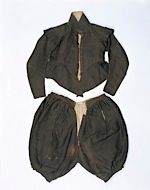- Edition: An Humorous Day's Mirth
Critical Introduction
- Introduction
- Texts of this edition
- Facsimiles
127Scholarly Characters
The part of Macilente, played by Asper in the play proper of Every Man out of His Humour, smacks more of spite than Lemotʼs mirthful outlook: in 5.3 Cordatus promises his fellow onstage observer Mitis, ‘you shall see the true picture of spite anonʼ (l. 428). Earlier in the same scene, Carlo Buffone has described the otherwise lean Macilente as lying ‘a-soaking in their frothy humours like a dry crust, till he has drunk ‘em all upʼ (ll. 26-28). Macilente plays the part of the scholar, and bemoans the fortunes of others. In 2.2 he is so charmed by the sight of Fallace that he enviously wishes himself to have been born a woman:
What moved the heavens, that they could not make
Me such a woman, but a man, a beast,
That hath no bliss like to others?
(ll. 158-60)
128Unlike Macilente, Lemot seems to have little concern about the fortunes or relationships of others and reveals no such envy himself. His interest in the other characters extends only to the entertainment they can provide him, and, by implication, the King.
129Macilente shares his scholarly, reclusive nature with another of Chapmanʼs creations, Dowsecer. In Scene 7, the latter, observed by the other characters, rails against the objects placed in his way by his friend Lavel. Whilst contemplating items of clothing he satirically concludes, ‘A large hose and a codpiece makes a manʼ (TLN 875-876), and continues by criticising fashion addicts, such as Fungoso, for whom the outer garment is of more importance than the interior person. His attitude contrasts with that of the gallants in the ordinary who express interest in Rowleyʼs collar and discuss its merits. Macilente, on the other hand, concurs with Dowsecer, and his following exclamation exposes both his envy and dismay at Fungosoʼs new suit:
I fain would know of heaven now why yond fool
Should wear a suit of satin? He? That rook?
That painted jay with such a deal of outside?
What is his inside, trow?
(2.2.206-10)
130Later in the play, Macilente is provided with clothes suitable for visiting court, since Fastidius Brisk has previously referred to him as a ‘seam-rentʼ fellow (Il.2.284). Macilente is struck by his own external decoration and marvels that ‘Be a man neʼer so vile/ In wit, in judgement, manners, or what elseʼ (3.3.11-12), if that man can ‘purchase but a silken cover,/ He shall not only pass, but pass regardedʼ (ll. 13-14). He amuses himself with the thought that the same man being ‘poor and meanly cladʼ (l. 15) could easily be mistreated by a man of lower degree and great ignorance.
131The King in An Humorous Dayʼs Mirth is similarly concerned with appearance and reality at the beginning of Scene 7 where he expresses disillusionment with his own genuineness. He curses the trumpeters who would seem to mock him, ‘Not telling what I am, but what I seem:/ A king of clouts, a scarecrow, full of cobwebsʼ (TLN 777). His consideration of the inner and outer trappings of man are what he shares with both Dowsecer, whose speech he pronounces as ‘but perfect judgementʼ (TLN 856), and Macilente.
132The role of the scholar is approached diversely by a range of other characters. In Every Man in His Humour, Lorenzo Senior is distressed by his sonʼs dedication to study in 1.1 and wishes to bring Lorenzo Junior back to a course of reason from his current state of folly, as he himself discovered to his advantage:
Myself was once a student and, indeed,
Fed with the self-same humour he is now,
Dreaming on naught but idle poetry.
But since, experience hath awaked my sprites,
And reason taught them how to comprehend
The sovereign use of study.
(1.1.15-20)
133Labervele is similarly distressed by his sonʼs scholarly pursuits, which have led Dowsecer to conclude that reproduction is of no interest to him, children being but troublesome burdens to their parents, and prompting anxiety in his father for the continuation of the family.
134However, not all characters are dismayed by scholarly behaviour. Just as Labesha is impressed enough to affect Dowsecerʼs construction and style of speech, if extremely badly, so does Clove of Every Man out of His Humour embark on a complex monologue, punctuated by Orangeʼs oaths. Clove expresses his admiration of scholars by wishing to be mistaken for one in St Paulʼs: ‘letʼs talk fustian a little and gull ‘em, make ‘em believe we are great scholarsʼ (3.1.169-70). Cloveʼs speech includes a misquotation of Julius Caesar, which he quotes as ‘Reason long since is fled to animalsʼ (ll. 193-94). An echo of this also appears in Scene 2 of The Wisdom of Doctor Dodypoll (1600), and is probably behind Dowsecerʼs desire to decompose within the earth and become grass eaten by ‘oxen, asses and such-likeʼ (TLN 934).
135The effect of Shakespeareʼs quote in Cloveʼs mouth simply serves to illustrate that, indeed, reason abides not there, but may well have fled to animals. Clove shortly abandons his pretentious discourse: ‘Let us return to our former discourse, for they mark us notʼ (3.1.200-1), highlighting the difference between those affecting a scholarly temperament, like himself, and a true scholar such as Dowsecer.
136While Clove and Orange desire to impress other people parading up and down the west aisle of St Paulʼs, but fail to be overheard, Dowsecerʼs speech expresses his internal thoughts for his own benefit. His language does not alter from his presumed solitary state to when he is engaged in conversation with his father. This marks him out as a true scholar, along with the simple fact that his words, difficult to untangle as they are, contain greater clarity than Cloveʼs cluster of impressive sounding words and ideas, presumably gleaned from overhearing others. It is this intelligence which impresses both the King and Martia when they listen to Dowsecer.
